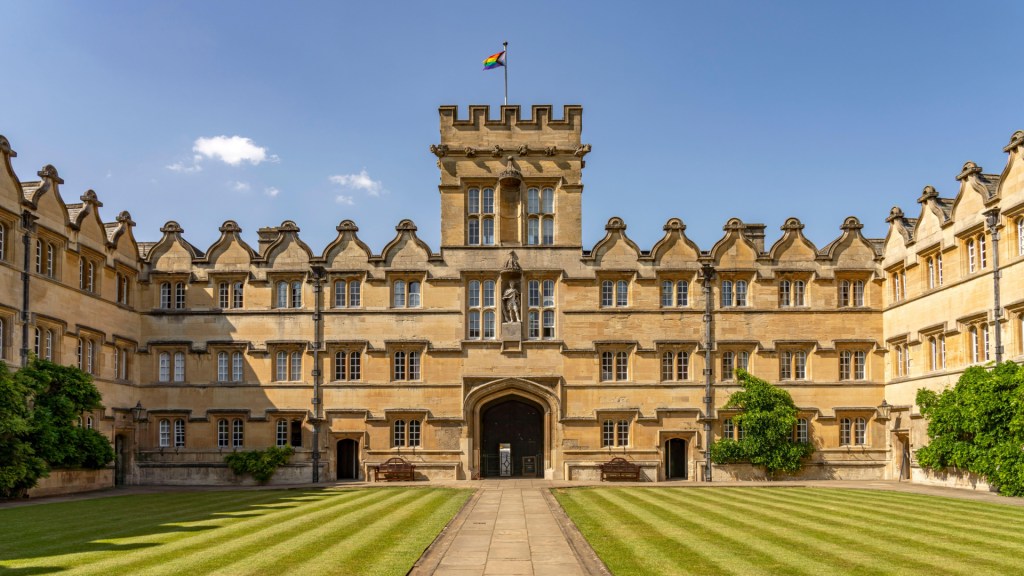The next Albanian ambassador to London will be Uran Ferizi. It is a remarkable appointment, not least because Dr Ferizi’s first encounter with Britain was when he arrived as an illegal immigrant in 1998. He was 17 years old, and he had nothing other than the clothes he stood up in.
I first got to know Uran Ferizi over a decade ago, and learned about his story then. He told me he had been determined to get to Britain since he was 15. He decided he wanted to study at the University of Oxford – partly because his father had cited an Oxford education as an example of something his son could not possibly achieve. That had infused the young Uran with a powerful desire to prove his father wrong. He felt there was no future for him in Albania. His parents had lost most of their savings when their bank invested in the Ponzi scheme that bankrupted millions of Albanians.
Uran’s successful struggle to get to Britain and Oxford proves his phenomenal perseverance
With help from his family, the teenage Uran Ferizi managed to put together the 300 deutsche marks then needed to buy a place on a clandestine boat from Albania to Italy. That boat was built to accommodate seven people. More than 30 were crammed into it. Italian police patrolled the Adriatic. To avoid them, the people smugglers picked a route that meant a journey that should have taken 30 minutes took several hours. The sea that night was dangerously rough. Another boat set out at the same time and from the same place. It went down somewhere between the coasts of Albania and Italy. Everyone on board drowned. Uran did not know this at the time. He only found out when he called home and discovered his mother thought he was dead: she assumed he had been on the boat that sank. The news in Albania had been full of the disaster.
Uran had to swim, in his clothes, the last 200 yards to get to Italy: the crew ordered all the passengers off the boat when it was still out at sea. When he finally emerged from the water, he walked for six hours to get to Brindisi. The people smugglers who organised the boat told him he could get a taxi to Milan from there. He gave his precious last 150 deutsche marks to a taxi driver. A totally exhausted Uran collapsed into the cab. When he woke up, the cab driver told him he was in Milan. It wasn’t until he got to the railway station that he realised that he wasn’t: he was still in Brindisi.
Hungry, cold, his clothes barely dry, and now with no money, the rational decision might have been to give up on going to Oxford. But Uran boarded a train going north to Milan. His first task was how to avoid the ticket collector. He took a seat in a carriage opposite a dignified Italian lady who had taken pity on him as he stood shivering in the station. He told her about his recent journey and about being defrauded by the taxi driver of all the money he had left. When the ticket collector arrived, and asked for his ticket – that woman paid Uran’s fare.
In Milan, Uran sneaked on to a train going to Antwerp, where he had a cousin he could stay with while he figured out how to get across the Channel. The problem was once again how to avoid the ticket collector. This time, the other occupants of his carriage were a group of journalists. He started a conversation with them about immigration. Sensing a story, they helped distract the ticket collector when he came around – and Uran again managed to take a long train journey without paying.
Once in Antwerp, Uran stayed with his cousin for three weeks. He worked out where in Ostend the lorries going to Britain parked overnight, and how to get into them without alerting the driver. The first time he managed to climb into the back of a lorry, he woke the driver, who promptly kicked him off his vehicle. The second time, the sniffer dog used by the local police found him. The police escorted him to the nearest station, ordered him to take the next train to Brussels, then left. Uran sat in an empty carriage. For the first time, he felt his dream of going to Oxford was over. Exhausted, depressed and hungry, he thought of how often his father had told him that he would never go to Oxford. That thought was enough to galvanise him into trying again. He got off the train and went to the queue of lorries waiting to be checked by customs and police.
He crept under a lorry he knew was going to Dover, and found a way to hang on to the chassis. He heard the searches start again: the police were back with the sniffer dog. He closed his eyes and waited for the inevitable. But the inevitable didn’t happen. This time, the dog didn’t notice him and the police went past without stopping. The lorry drove up the ramp and on to the ferry. The individual who will in early 2024 present his credentials to King Charles III crawled out from underneath the stationary lorry. He was finally on his way Britain.
Once he arrived in Dover, Uran contacted the local council. As he was not yet 18, he was a minor and social services had to look after him. He was given £20 and a place to stay. But he wanted to get to Oxford. He took a train to London. There, he contacted social services, who found him a room that he shared with another illegal migrant.
Uran’s first task was to get a job. After four days of walking around London stopping at every place that had a sign outside offering work, he got a job washing dishes in a Greek restaurant in Islington. He also started attending evening classes, first to improve his English, then to get A levels, which he knew he needed if he was to get to Oxford. He also met the woman who would become his wife. Although he loved her – he remembers her vividly as ‘pretty and smart’ – the marriage fell apart over the issue of children and Oxford. He wanted children. She did not. He was determined to go to Oxford. She told him he had to choose between her and Oxford.
He chose Oxford. They divorced.
Uran passed Maths and Physics A level with grade A. He applied to University College, Oxford. He was called for an interview and took the college’s Maths test. To his unconstrained delight, he was offered a place to study engineering. But he was still an illegal immigrant. He could not take up that place until his status was regularised. He went to Lunar House in Croydon, the Home Office’s centre for visas and immigration. He was taken to an official who explained to Uran that he could deport him right now. Uran showed the official the letter from Oxford. He told the official that he had a choice: he could destroy a young man’s promising future by deporting him. Or he could give him the opportunity to go to Oxford and do something useful with his life.

The official told Uran to wait outside his office while he consulted with his colleagues. After what seemed an eternity, Uran Ferizi was summoned. The official gave him a piece of paper. At the top it was stated: Indefinite Leave to Remain.
Dr Ferizi doesn’t know how the decision was made, or exactly why the Home Office officials decided to let him stay in Britain. According to a strict application of the rules, he should have been deported, and now, under the same circumstances, an illegal, undocumented Albanian migrant – as he was – surely would be.
Uran Ferizi later applied for and received British citizenship. In order to become Albanian Ambassador to London, he has had to renounce his British citizenship, as diplomatic status requires. It was a very painful decision. Being British is very dear to him: the debt of gratitude he feels to this country is colossal. He has been assured that he can reapply once his time as Albanian Ambassador is over.
But why was he chosen to be Albania’s ambassador in the first place? After Oxford, Dr Ferizi was a banker for a short period, before completing a PhD in the micro-structural modelling of the brain at UCL. He then worked at the medical schools of NYU and Stanford. His research contributes to advances in the early diagnosis of illnesses such as multiple sclerosis and Parkinson’s, benefiting people not only in this country but around the world.
These are impressive achievements, but they are not obvious qualifications for being an ambassador to London. They do, however, demonstrate Dr Ferizi’s powerful intelligence, which is a relevant qualification – as is his perfect command of English, which he speaks as well as, indeed better than, many English people. His successful struggle to get to Britain and to Oxford also proves his phenomenal perseverance and determination, both of which are critical to success in diplomacy and politics.
When Rishi Sunak meets the next Albanian Ambassador to London, the Prime Minister will be encountering a man who knows from the inside the problems of immigration by Albanians to Britain. If there is a solution to those problems, no one is better placed to find it than His Excellency Uran Ferizi.
This article is free to read
To unlock more articles, subscribe to get 3 months of unlimited access for just $5







Comments
Join the debate for just £1 a month
Be part of the conversation with other Spectator readers by getting your first three months for £3.
UNLOCK ACCESS Just £1 a monthAlready a subscriber? Log in